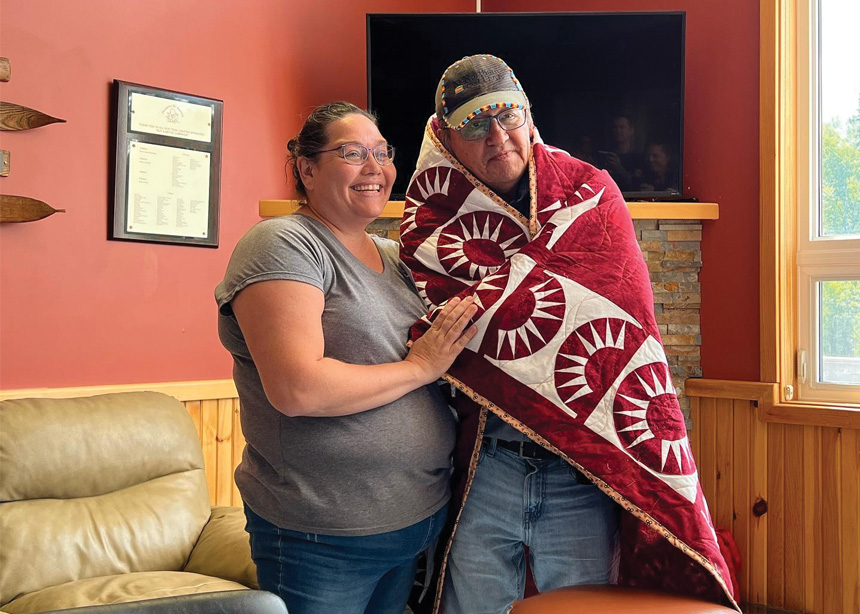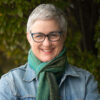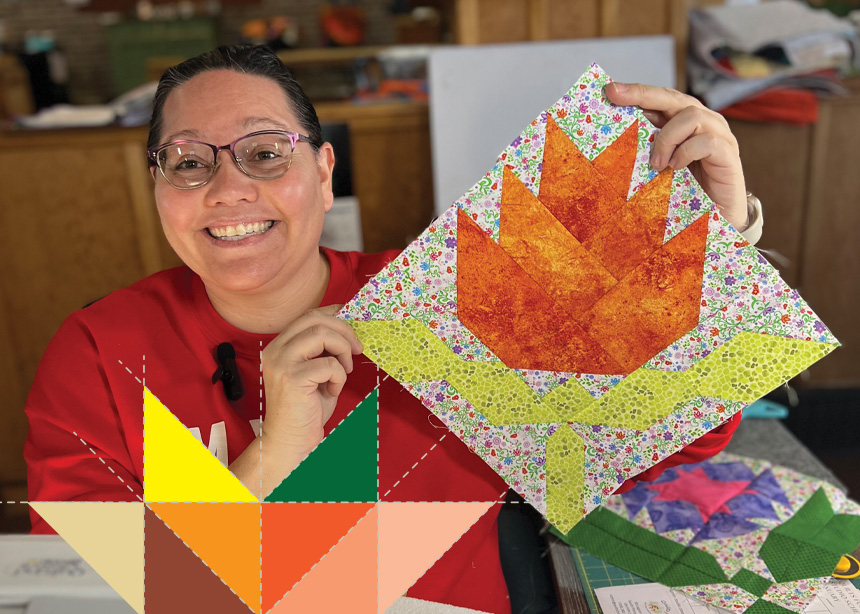The story isn’t about Mennonite Central Committee. That’s what Cam McEachern stresses.
McEachern, Indigenous Neighbours program associate at the Mennonite Central Committee Ontario (MCCO) office in Timmins, Ontario, describes MCCO’s role as “an incidental, though helpful, element to this phenomenon.”
“The story is about Vanessa and her undertaking and achievements,” McEachern says.
Vanessa Genier is an Indigenous woman from Missanabie Cree First Nation near Sault Ste. Marie, Ontario. Genier is an entrepreneur, a recent business graduate of Northern College and Laurentian University, a mother of five and, crucially, a quilter.
In 2021, when the Tk’emlúps te Secwepemc First Nation announced the discovery of suspected graves at the site of the former Kamloops Indian Residential School, Genier immediately put out a Facebook request for fellow quilters to help her assemble 215 quilt blocks—each representing the suspected grave of a child—with the intention of sending a quilt to a relative who was an Indian Residential School survivor.
Genier tells Canadian Mennonite, “In my community, we always gave blankets. Making and giving them— wrapping people in honour—is not a new concept.”

Quilt blocks came in quickly, and so did requests for quilts for other residential school survivors. As word spread, Genier’s vision grew. Would it be possible to give a quilt to every residential school survivor?
At the time, there were approximately 40,000 survivors, as well as those, like Genier, who have experi- enced intergenerational trauma—her grandparents were residential school survivors but kept her parents out of the schools.
From 1960 to 1991, two Mennonite mission agencies ran three Indian Residential Schools in Northwestern Ontario, and MCC volunteers worked at another north of Prince Albert, Saskatchewan.
Historically, Genier had mixed experiences with Mennonites. As a child, she attended a Mennonite Brethren church in Leaf Rapids, Manitoba, and later what was then Red Lake Mennonite in Red Lake, Ontario. She recalls both as not being a good fit for her, as they were “too religious and not enough spiritual.” Two of her siblings attended a Mennonite day school near Ridley, Ontario.
But her experience with MCCO in Timmins has been uniformly positive. “As optimistic as I am,” Genier says, “sometimes I don’t know where we’re going. When I have a panic moment, I reach out to the MCC community and say: this is my struggle this week. I bounce ideas off them and ask them to send up a prayer.”
MCCO has worked in Timmins since 1993 and has many longstanding relationships. They take a “listening into action” approach in supporting Indigenous entrepreneurs and communities in northern Ontario.
To help Genier maintain production of quilts without interruption, MCCO staff helped Genier promote what she was doing. They wrote grant applica- tions and raised funds for equipment and staff. They provided and packed boxes when Genier had to move and solicited materials and quilts to meet demand.
The venture became a full-time enterprise for Genier and continues to scale up. Today, Genier’s organization, now a registered non-profit called Quilts for Survivors (Q4S), includes 20 volunteers, two staff other than Genier, eight sewing machines (soon to be 10) and three long-arm machines that fasten quilts together.
While this means that quilts can be sewn together more quickly, it also created challenges in terms of space. The organization has moved several times over the past few years, sometimes because the landlord needed the space and other times because the space was bursting at the seams.
This past June, when Genier received word that Q4S would have to vacate its former premises by the end of the summer, she turned to MCCO staff for help.
“They said: ‘We’ve got you. We’ll help you, whatever you need. We’ll keep our ears to the ground,’” Genier recalled.McEachern regularly drives by a large, deconsecrated Anglican church in the South Porcupine neighbourhood of Timmins. He approached the denominational administration, proposing that providing the building to Q4S might fit the church’s Truth and Reconciliation goals. The Anglican bishop offered Q4S a renewable five-year, rent-free lease, including utilities.
To make space for the venture, McEachern reached out to a group of Old Order Mennonites near Matheson, Ontario, who had helped renovate the Timmins MCCO office. Although it was harvest season, the group came to remove pews. This winter, they will add wiring and construct a conference room and offices within the Q4S space, with costs covered by MCCO.
While five per cent of Canadians identify as Indigenous, the figure is nearly three times as high in Timmins, with many coming from communities on the James Bay coast. MCCO is well-positioned in Timmins to have contact with those communities. Its priorities include developing business and craft skills among artisans, facilitating a healing fund and advocating for better access to clean drinking water.
Supporting Genier’s work fits well. The project and its founder have received acclaim, with Genier receiving a Meritorious Service Decoration (Civil Division) from the Governor General, while Q4S was awarded the 2023 Inclusive Growth Award from the Canadian Chamber of Commerce.
In its first three years, Q4S has produced and shipped 6,300 quilts. Each quilt is sent with a personalized letter, poem and label. Genier estimates it will take another decade to complete the project.
The current wait time from request to receiving a quilt is 11 to 12 months.
When quilts are finished, Q4S smudges them with sage, purifying them from any passing anxiety from the quilt maker so that the quilts are healing in all respects when received.
The impact of receiving a healing quilt has been significant. Genier has received letters from survivors saying they cried for days.
McEachern describes attending a conference on the James Bay coast where 150 Q4S quilts were distributed. He says, “To see everyone pulling them tight around themselves … there was an incredibly good vibe. The receiving of a quilt or a comforter is telling you that someone knows about you, your history, and they care. It is like giving a hug. On a psychological level, it is giving communities. Its priorities include somebody the kind of recognition and permission to enter the healing process. You realize there is a therapeutic process going on. It’s really extraordinary.”







Leave a Reply
You must be logged in to post a comment.